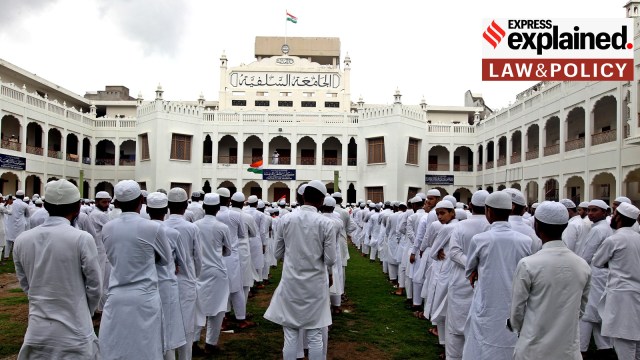UP Madarsa Education Act upheld by SC: What was the case?
SC Verdict on Madarsa Act: The impact of the SC decision will be felt directly in Uttar Pradesh, but CJI Chandrachud repeatedly cautioned the lawyers during hearings that it will likely have wider ramifications on religious education across the country.
 Students at the Jamia Salafia Madrasa in Varanasi taking part in Independence Day celebrations. (Express file photo)
Students at the Jamia Salafia Madrasa in Varanasi taking part in Independence Day celebrations. (Express file photo)UP Madarsa Education Act: A three-judge Bench of the Supreme Court, presided over by Chief Justice of India D Y Chandrachud, on Tuesday (November 5) upheld the Constitutional validity of the Uttar Pradesh Board of Madarsa Education Act, 2004 (Madarsa Act).
The Allahabad High Court earlier struck down the Act in March, saying it violated the principles of secularism. In April, the apex court stayed the HC verdict until it decided on the validity of the law. Here is what to know.
What is the 2004 UP Madarsa Act?
The Madarsa Act provides the legal framework for madarsa education where, apart from the curriculum of the National Council of Educational Research and Training (NCERT), religious education is imparted as well.
It created the Uttar Pradesh Board of Madarsa Education, predominantly comprising members of the Muslim community. The functions of the board are detailed under Section 9 of the Act and include preparing and prescribing course material and conducting exams for all courses from ‘Maulvi’ (equivalent to Class 10) to ‘Fazil’ (equivalent to a Master’s).
A lawyer had challenged the Act in a petition, saying “the provisions, scheme and the environment” created by it violated Articles 14 (right to equality before law), 15 (prohibition of discrimination on grounds of religion, race, caste, sex, place of birth) and 21-A (right to free and compulsory education for children between the ages of 6 and 14) of the Constitution.
He also claimed that the madarsa Act failed to provide quality compulsory education up to the age of 14 years or Class 8, and universal and quality school education to all the children studying in madarsas, required under Article 21.
The UP government told the Supreme Court Bench it was of the view that the law is constitutional. It said that the Act need not have been struck down in entirety and only the offending provisions need to have been examined.
According to data presented by the Centre to Parliament on February 3, 2020, as of 2018-19, of the total 24,010 madarsas in India, more than 60% — 14,528 — were in UP. These included 11,621 recognised madarsas. About 1.69 lakh students sat for the UP madarsa education board examinations — equivalent to Class 10 and Class 12 — in 2023.
What was the Allahabad HC’s decision?
On March 22, a Bench of Justices Subhash Vidyarthi and Vivek Chaudhary of the Allahabad HC struck down the Act in its entirety, deeming it unconstitutional on three main grounds:
1. SECULARISM: Referring to past SC cases, the HC held that secularism means “equal treatment to all religions and religious sects and denominations by the State, without either identifying itself with or favouring any particular religion, religious sect or determination”.
The court found that “… (it is) compulsory for a student of Madarsa to study in every class, Islam as a religion, including all its prescriptions, instructions and philosophies… The modern subjects are either absent or are optional…” It held that the government has a duty to provide secular education, and cannot “discriminate” by providing education based on religion.
2. RIGHT TO EDUCATION: Article 21A of the Constitution states: “The State shall provide free and compulsory education to all children of the age of six to fourteen years in such manner as the State may, by law, determine.”
The HC held that the government was violating this right by denying “quality” education in modern subjects. “The State cannot hide behind the lame excuse that it is fulfilling its duty by providing traditional education on nominal fee,” the court said.
3. CONFLICT WITH CENTRAL LAW: The HC held that the provisions of the Madarsa Act empowering the madarsa board to grant degrees was in conflict with the University Grants Commission Act, 1956 (UGC Act).
It stated that only universities or institutions “deemed to be a University” under Section 3 of the UGC Act can grant degrees, and “no other person or authority, including any Madarsa or the Madarsa Board, can confer any degree”.
Arguments before SC
During the hearings in October 2024, two main questions emerged.
FIRST, whether a madarsa imparts “religious education” or “religious instruction”. In Ms. Aruna Roy vs Union of India (2002), the SC drew a distinction between the two. The court held that religious instruction, such as compelling attendance for religious worship, was not allowed in educational institutions recognised by the state as per Article 28 of the Constitution. But the purpose of religious education, or “education about religions”, was to teach students about different religions “for bringing communal harmony…”, the court held.
During the hearing on October 21, Senior Advocate Menaka Guruswamy argued that “the HC wrongly conflates regulation with religious instruction and thereby says religious instruction violates secularism as provided for by the Constitution”.
SECOND, whether the HC was correct in striking down the entire Act, or whether it should have limited the decision to specific provisions and allowed the government to regulate the functioning of madarsas.
On October 22, CJI Chandrachud observed that “to throw out the (Madarsa) Act is to throw the baby out with the bathwater”. He said that the state government has the power to make rules under the Act to ensure that the education imparted is more secular in nature.
The respondents, represented by Senior Advocate Guru Krishna Kumar, argued that the Act is not designed to ensure that students receive secular education or enter the mainstream. He said the Act only cements the status quo, wherein mainstream subjects are optional and religious education is mandatory.
Impact of the decision
The impact of the SC decision will be felt directly in UP, but the CJI repeatedly cautioned the lawyers during hearings that it will likely have wider ramifications on religious education across the country. The CJI’s comments appeared to indicate that all educational institutions that impart some manner of religious education (such as gurukuls and convent schools) will be affected by the decision on how the principles of secularism interact with the functioning of these institutions.
This is an updated version of an explainer first published in October 2024.


- 01
- 02
- 03
- 04
- 05




































